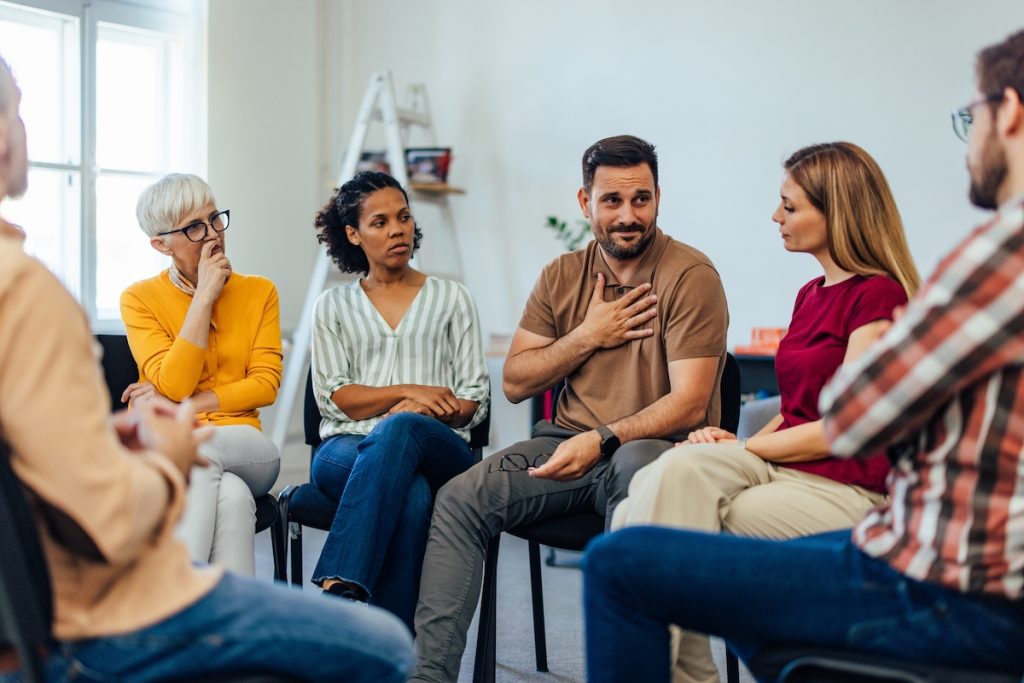
‘Hearing voices’ refers to the experience of hearing someone talking to you, or other sounds, which nobody else can hear. These sounds/voices are auditory hallucinations, which come from the person’s own mind, rather than from an external source (or another person). They are more common than you may think – up to 28% of the general population will experience hearing voices (Corentin et al., 2023).
‘Hearing Voices Groups’ (HVGs) are an important resource for voice hearers, for whom care in mental health services largely consists of medication and/or talking therapies. Psychological and psychiatric interventions may alleviate some of the symptoms, but voice hearers often ‘require a more meaningful way to explore their experiences in an open and safe environment’. This is the kind of support provided at HVGs. Other Mental Elf blogs written by Akther (2020), Badenoch (2021) and Barnby (2018) bring differing perspectives and reactions to voice hearing; this is the first blog to specifically discuss the experience of HVGs among voice hearers.
This blog discusses a systematic review of the benefits of ‘Hearing Voices Groups’ (HVGs), or self-help meetings for people who hear voices (Corentin et al., 2023). The authors mention that to their knowledge ‘no other systematic review on this topic has been conducted’ with this scope. Therefore, it is useful to synthesise and critically consider a large amount of literature on the benefits of HVGs and other self-help groups for this population, as discussed in Longden et al. (2018); Ruddle et al. (2011); Dillon, J., & Longden, E. (2013); Dillon & Hornstein, (2013); Escher & Romme (2012); and Higgs (2020).

Hearing Voices Groups can offer a safe environment for voice hearers to unpack their lived experience of hearing voices in a meaningful way.
Methods
This systematic review follows models, manuals, checklists and eligibility criteria to appraise and reduce a long list of studies into a shortlist of eligible studies on the topic under examination for a detailed analysis.
The authors searched multiple databases (i.e., CINAHL Plus, PsycArticles, PsycInfo) and used the ‘Joanna Briggs Institutes Manual on Systematic Reviews’ and PRISMA (Preferred Reporting Items for Systematic Reviews and Meta-Analyses); these frameworks provide useful guidance to follow when conducting a systematic review, specifically on healthcare studies. The authors also used the P.I.C.O framework (Population, Intervention, Comparison, Outcomes) to determine their eligibility criteria and support their search strategy to find relevant studies. Studies were included if they were reporting on the experiences of voice hearers only, focused on HVGs or other self-help groups for voice hearers, and investigated their views and feedback on outcomes. The authors excluded studies focusing on the experiences of carers, clinicians and other stakeholders.
The authors critically appraised the studies using the Joanna Briggs Institutes (JBI) quality appraisal tool and the mixed methods appraisal tool (MMAT) depending on the methodology. A narrative synthesis of the findings was then completed.
Results
Of the 506 identified studies, 21 studies were full-text screened, and 13 studies were included in the final review (8 qualitative; 2 cross-sectional; 1 mixed-methods; 1 case study and 1 case-series study). In total, 240 participants were included in the studies which were conducted in the UK, Australia, Italy, Hungary, Netherlands, and Canada.
HVGs/self-help groups provide many benefits for participants including the provision of a supportive, safe, and social place where people with similar experiences can meet up, and gain support, hope, inspiration, connectedness, increased self-esteem, knowledge, and coping skills. Results demonstrate that in HVGs, talking to like-minded people who are experiencing similar difficulties allows participants to feel understood, and not alone. As the authors say:
These findings indicate that for those in society who often feel most marginalised, meeting others with similar experiences can be liberating and reduce the stigmatisation of being a voice hearer, and even more so if you have a learning disability also.
HVGs and self-help groups provide a service which is unlike any other; it seems to fill a gap seen in mental health services provided by the NHS, offering a different kind of (peer-led) support. The results also consider the role of healthcare professionals within the HVG, once they have a clear understanding of the benefits of such groups and the confidence to talk to voice hearers about the groups.
The studies also reveal how HVGs support participants, focusing not on ‘what is wrong with you’ but ‘what happened to you’. This is particularly important as ‘Once a voice hearer gains a better understanding of their voices, voices become less stressful, less negative, and more manageable’.

Hearing Voices Groups and self-help groups can help people better understand their voices and feel more empowered to manage them.
Conclusions
The findings of this review indicate various benefits for voice hearers who attend HVGs or self-help groups. This does not mean they stop hearing voices. On the contrary, the review concludes that ‘the alleviation of voices or symptoms is not always viewed as a necessary factor in the recovery journey of those who attend an HVG/self-help group’. This notion is important (even empowering) for voice hearers’ sense of themselves; it is also important for healthcare professionals, who could reconsider their own notions of illness, symptom reduction and recovery. On this note, the authors present HVGs as ‘an alternative narrative surrounding the voice hearing phenomenon, which can complement and not replace current mental health treatments’ (Corentin et al., 2023).

Groups for voice hearers can offer an alternative means of support, which can complement psychological and psychiatric interventions.
Strengths and limitations
The authors had a clear research question and identified the need to explore the benefits of HVGs and self-help groups focusing solely on the perspectives of voice hearers. They used appropriate appraisal tools for the methodological designs under examination and reported on the quality of each study (moderate to very good).
There are some limitations to the study; although the authors conducted a narrative synthesis of the evidence, they did not limit their review to qualitative data. To ensure that the authors have followed a rigorous process, it would have been helpful if they had submitted a protocol on Prospero. Given the focus is on peer-led groups, a major limitation of this paper is not including direct input from experts by experience. The authors note this limitation, saying: ‘the inclusion of people with lived experience of mental health challenges could have led to further insights’. Examining grey literature and first-person feedback and research done by the Hearing Voices Network would solidify and back up the aims and intentions of this review.
This study focuses on voice hearers, without considering people who experience other kinds of hallucinations (also supported by HVGs, which sometimes call themselves ‘Unusual Experiences Groups’). What is it about hearing voices, rather than other kinds of hallucinations or broader symptoms, which makes HVGs work?

The review would be stronger if the authors involved or consulted experts by experience in the design and execution of the study.
Implications for practice
This study is important because it raises awareness of available resources, such as HVGs and peer support, from which people who hear voices can access care outside mental health services. The findings can be used to inform further training for professionals working in secondary care mental health services (i.e., CMHTs) and/or those supporting people who hear voices. Healthcare professionals should be aware of the benefits of HVGs and other groups and encourage collaborations between HVGs and the NHS (i.e., via signposting or community referrals).
This study called for reflection on my lived experience of such groups. I attended an HVG (opened as an ‘Unusual Experiences Group’) during one of my admissions to a psychiatric ward at the Warneford Hospital in Oxford, in 2017. The medical staff on the ward seemed baffled by my hallucinations, so one nurse recommended I attend a meeting of the local HVG to access support. When I entered the meeting, I was daunted, I felt like a dubious outsider. One man gazed at me, his lucid, grey-blue eyes pierced right through me, for a very long time. My hallucinations intensified until the (small) room was full of men’s faces staring at me, piercing me. It was hard to tell what was ‘real’. This was more immediately triggering than helpful. When everyone shared something about their experiences, I did not know what to say. I feared jeering or disbelief. But when I spoke, several people nodded, some could relate; suddenly I felt understood. I did not go to many sessions, because I felt overwhelmed and scared by some of the participants. It seemed to confirm and expand what I needed to diminish and distract myself from.
In my experience, there were benefits and risks involved in attending the HVG. These groups can’t help everyone, all the time. However, HVGs clearly provide a useful resource for people who hear voices or have other ‘unusual’ experiences, outside (and fill the gaps of) NHS mental health services. I am struck with the central tenet of HVGs, that recovery does not mean getting rid of the voices: you can learn to live with them, and you can live well. This is empowering and hopeful.

Recovery can mean learning to live with the voices, connecting with people with similar experiences and living well.
Statement of interests
Lorna hears voices (amongst other things), and attended the HVG in Cowley Road, Oxford, in 2017. Lorna has no conflicts of interest in relation to the study reviewed.
Links
Primary paper
Clyde Corentin, Caroline Fitzgerald & John Goodwin (2023) Benefits of Hearing Voices Groups & Other Self-Help Groups for Voice Hearers: A Systematic Review, Issues in Mental Health Nursing, 44:4, 228-244, https://doi.org/10.1080/01612840.2023.2189953
Other references
Dillon, J. & Hornstein, G. (2013) Hearing voices peer support groups: a powerful alternative for people in distress, Psychosis, 5(3), 286-295. https://doi.org/10.1080/17522439.2013.843020
Dillon, J., & Longden, E. (2013). ‘Hearing voices groups: Creating sage places to share taboo experiences’ in Romme, M. & Escher, S. (2012). Psychosis as a personal crisis: An experience based approach, New York: Routledge: 129-140.
Dos Santos, B. and Beavan, V. (2015), “Qualitatively exploring hearing voices network support groups”, The Journal of Mental Health Training, Education and Practice, 10(1), 26-38. https://doi.org/10.1108/JMHTEP-07-2014-0017
Escher, S., Romme, M. (2012). ‘The Hearing Voices Movement’ in Blom, J. & Sommer, I. (eds.) Hallucinations. New York: Springer. https://doi.org/10.1007/978-1-4614-0959-5_28
Higgs, R. N. (2020). ‘Reconceptualizing Psychosis: The Hearing Voices Movement and Social Approaches to Health’ in Health and Human Rights Journal, 22(1), 133-144. https://www.hhrjournal.org/2020/06/reconceptualizing-psychosis-the-hearing-voices-movement-and-social-approaches-to-health/
Longden, E., Read, J., & Dillon, J. (2018). Assessing the Impact and Effectiveness of Hearing Voices Network Self-Help Groups. Community mental health journal, 54(2), 184–188. https://doi.org/10.1007/s10597-017-0148-1\
Oakland, L. & Berry, K. (2015) ‘Lifting the veil’: a qualitative analysis of experiences in Hearing Voices Network groups, Psychosis, 7:2, 119-129. https://doi.org/10.1080/17522439.2014.937451
Payne, T., Allen, J., & Lavender, T. (2017) Hearing Voices Network groups: experiences of eight voice hearers and the connection to group processes and recovery, Psychosis, 9(3), 205-215. https://doi.org/10.1080/17522439.2017.1300183
Ruddle, A., Mason, O., Wykes, T. (2011). A review of hearing voices groups: Evidence and mechanisms of change, Clinical Psychology Review, 31(5), 757-766. https://doi.org/10.1016/j.cpr.2011.03.010.
Schaefer, B., Boumans, J., van Os, J., van Weeghel, Jaap (2021). ‘Emerging Processes Within Peer-Support Hearing Voices Groups: A Qualitative Study in the Dutch Context, Frontiers in Psychiatry, 12. 1https://doi.org/10.3389/fpsyt.2021.647969
Syeda Akther, 23/01/2020. ‘What are the people hearing voices saying?’ https://www.nationalelfservice.net/mental-health/psychosis/people-hearing-voices-saying/
Douglas Badenoch, 27/01/2021. ‘Hearing voices: experiences of children and young people #CAMHScampfire’
https://www.nationalelfservice.net/populations-and-settings/child-and-adolescent/hearing-voices-experiences-children-young-people-camhscampfire/
Joe Barnby, 07/02/2018. ‘Facing our inner voices: AVATAR therapy for auditory hallucinations in people with psychosis’
https://www.nationalelfservice.net/mental-health/psychosis/facing-our-inner-voices-does-digital-personification-of-hallucinated-voices-help-those-with-psychosis/
Photo credits
- Photo by Vardan Papikyan on Unsplash
- Photo by Jamie Brown on Unsplash

I need to be contacted please as I am looking to join a group that hear voices. It’s important that share my life. Thank you for the opportunity